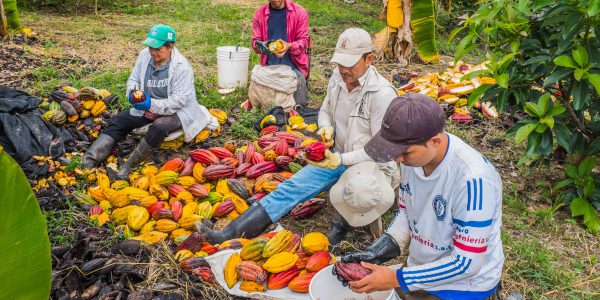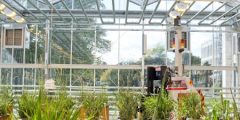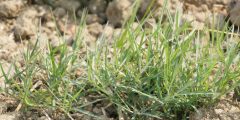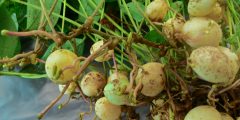Cocoa fermentations and chocolate flavours
November 8, 2022
During the first week of July, a team of researchers from the Future Food Beacon travelled down to London to join the Royal Society Summer Science festival. After a competitive selection process, endless organising, liaising with external suppliers, and sourcing cocoa saplings, we were finally ready to share our awesome research on cocoa fermentations with …
Our Future Food Director’s first thoughts
October 19, 2022
This post is written by Andrew Salter. It has been a very strange start to the autumn term for me. For over 30 years, this time of year has been associated with preparing for teaching in the forthcoming semester. Instead, while I watch my colleagues going through this process, I am trying to get to …
Antibiotic resistance and AI: New role for Dr Tania Dottorini
October 6, 2022
Dr Tania Dottorini, Associate Professor in Bioinformatics and a member of the Future Food Beacon, is taking up a new position (alongside her day job) as the Director for the Centre of Smart Food for Health (CSFH), at the University of Nottingham Ningbo Campus. Dr Dottorini, based in the School of Veterinary Medicine and Science, …
Next Generation X-ray Computed Tomography system awarded to UoN Hounsfield Facility, boosting soil research capacity
September 27, 2022
Soils represent a major store of global carbon, much more so than that held in vegetation or the atmosphere. However, this reservoir of soil organic carbon (SOC) is highly susceptible to destabilisation and loss, leading to declines in soil health, loss of biodiversity, and nutrient capital, and the release of harmful greenhouse gases (GHGs). We …
Open letter from Prof David E Salt, Director of the Future Food Beacon of Excellence
April 8, 2022
Following on from the recent announcement by Zoe Wilson PVC Science (5th April, 2022) that I will be stepping down as the Director of the Future Food Beacon on the 31st July 2022, I would like to take this opportunity to thank you for all your support and hard work. Your willingness to contribute to …
Improving animal feeds for the future: An interview with Noriane Cochetel
March 22, 2022
Noriane Cochetel is a PhD candidate with the Future Proteins Platform. Her supervisors are Ying Zhang, Tim Parr, John Brameld and Andrew Salter. Prior to beginning a PhD Noriane was completing her six-months placement in a research institute, Nofima, in Ås, Norway, as part of the programme from her MSc in Nutrition and Food Science. …
Evolving grass pea from ‘orphan’ crop to staple food
September 8, 2021
This post is written by Drs Peter Emmrich and Levi Yant. Malnutrition from protein deficiency is a widespread problem and concern. Populations in the developing world are at particular risk due to the higher costs of animal proteins when compared to plant proteins. These populations therefore tend to rely on protein-rich plant-based foods like beans, …
The National Food Strategy: our Director responds
July 15, 2021
This post is written by Prof David Salt. We welcome the publication of the National Food Strategy today. Since 2017, the Future Food Beacon has spearheaded transdisciplinary research on food systems, clear in the knowledge that our food systems must change in order to preserve population health and the health of the planet. The current …
Understanding plant microbe interactions
July 29, 2020
Dr Gabriel Castrillo is a Nottingham Research Fellow whose research focuses on the definition of the molecular mechanisms of plant-microbe interactions. He has won funding from The Leverhulme Trust, the Royal Society and recently, a joint award from the BBSRC (UK) and the National Science Foundation (US) in collaboration with colleagues from the University of …











Recent Comments